| Listing 1 - 7 of 7 |
Sort by
|
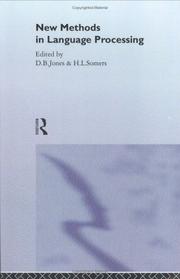
ISBN: 1857287118 9781857287110 Year: 1997 Volume: *1 Publisher: London: UCL Press,
Abstract | Keywords | Export | Availability | Bookmark
 Loading...
Loading...Choose an application
- Reference Manager
- EndNote
- RefWorks (Direct export to RefWorks)
Automatic language processing --- Computational linguistics --- Computer linguistics --- Computerlinguïstiek --- Language and languages -- Data processing --- Language data processing --- Langue naturelle--Traitement des données (Informatique) --- Linguistics -- Data processing --- Linguistique -- Informatique --- Linguistique -- Traitement des données --- Linguistique computationnelle --- Linguistique informatique --- Linguistique informatisée --- Natural language processing (Computer science) --- Natural language processing (Linguistics) --- Natuurlijke taal--Gegevensverwerking (Informatica) --- Taalwetenschap -- Gegevensverwerking
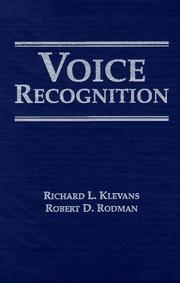
ISBN: 0890069271 Year: 1997 Publisher: Boston ; London Artech House
Abstract | Keywords | Export | Availability | Bookmark
 Loading...
Loading...Choose an application
- Reference Manager
- EndNote
- RefWorks (Direct export to RefWorks)
Automatic speech recognition --- Automatische spraakherkenning --- Langage--Systèmes de traitement des données --- Langue naturelle--Traitement des données (Informatique) --- Mechanical speech recognition --- Natural language processing (Computer science) --- Natuurlijke taal--Gegevensverwerking (Informatica) --- Parole [Reconnaissance automatique ] --- Reconnaissance automatique de la parole --- Speech processing systems --- Speech recognition [Automatic ] --- Spraakherkenning [Automatische ] --- Spraakverwerkingssystemen --- Voice prints --- Voiceprints --- #SBIB:309H1713 --- #SBIB:AANKOOP --- Computational linguistics --- Electronic systems --- Information theory --- Modulation theory --- Oral communication --- Speech --- Telecommunication --- NLP (Computer science) --- Artificial intelligence --- Electronic data processing --- Human-computer interaction --- Semantic computing --- Mechanical speech recognizer --- Speech recognition, Automatic --- Pattern recognition systems --- Perceptrons --- Speech, Intelligibility of --- Speech perception --- Voiceprinting --- Identification --- Mediatechnologie: nieuwe toepassingen (abonnee-televisie, electronic mail, desk top publishing, virtuele realiteit...) --- Singing voice synthesizers --- Speech processing systems.
Periodical
Abstract | Keywords | Export | Availability | Bookmark
 Loading...
Loading...Choose an application
- Reference Manager
- EndNote
- RefWorks (Direct export to RefWorks)
Information systems --- Data mining --- Database searching --- Exploration de données (Informatique) --- Bases de données --- Periodicals. --- Périodiques --- Interrogation --- Information retrieval --- Data Mining --- Bases de données --- Recherche de l'information --- #TS:WBIB --- Periodicals --- Information Technology --- Mathematical Sciences --- Data Storage and Data Mining --- Database Design & Management --- Information Extraction, Retrieval and Filtering --- Information Science and Systems --- Applied Mathematics --- data mining --- Data retrieval --- Data storage --- Discovery, Information --- Information discovery --- Information storage and retrieval --- Retrieval of information --- Documentation --- Information science --- Information storage and retrieval systems --- Data base searching --- Database search strategies --- Search strategies in databases --- Searching databases --- Electronic information resource searching --- Algorithmic knowledge discovery --- Factual data analysis --- KDD (Information retrieval) --- Knowledge discovery in data --- Knowledge discovery in databases --- Mining, Data --- Data mining. --- Database searching. --- Information retrieval. --- Datagruvedrift
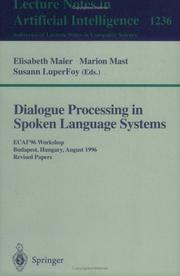
ISBN: 3540631755 3540692061 Year: 1997 Volume: 1236 *162 Publisher: Berlin, Heidelberg : Springer Berlin Heidelberg : Imprint: Springer,
Abstract | Keywords | Export | Availability | Bookmark
 Loading...
Loading...Choose an application
- Reference Manager
- EndNote
- RefWorks (Direct export to RefWorks)
This book constitutes the strictly refereed post-workshop documentation of the ECAI'96 Workshop on Dialogue Processing in Spoken Language Systems, held in Budapest, Hungary, in August 1996, during ECAI'96. The volume presents 16 revised full papers including a detailed introduction and survey paper by the volume editors. The papers are organized in sections on foundations of spoken language dialogue systems, dialogue systems and prosodic aspects of spoken dialogue processing, spoken dialogue systems-design and implementation, and evaluation of systems. The book reports on work being pursued both in academia and in industry as a crucial issue in speech processing.
Homme et ordinateur [Interaction entre ] --- Human-computer interaction --- Interactie tussen mens en computer --- Interaction entre l'homme et l'ordinateur --- Langue naturelle--Traitement des données (Informatique) --- Mens-computer interactie --- Natural language processing (Computer science) --- Natuurlijke taal--Gegevensverwerking (Informatica) --- Computer Science --- Engineering & Applied Sciences --- Computer-human interaction --- Human factors in computing systems --- Interaction, Human-computer --- NLP (Computer science) --- Engineering. --- Artificial intelligence. --- Signal, Image and Speech Processing. --- Artificial Intelligence (incl. Robotics). --- Construction --- Industrial arts --- Technology --- AI (Artificial intelligence) --- Artificial thinking --- Electronic brains --- Intellectronics --- Intelligence, Artificial --- Intelligent machines --- Machine intelligence --- Thinking, Artificial --- Bionics --- Cognitive science --- Digital computer simulation --- Electronic data processing --- Logic machines --- Machine theory --- Self-organizing systems --- Simulation methods --- Fifth generation computers --- Neural computers --- Artificial Intelligence. --- Signal processing. --- Image processing. --- Speech processing systems. --- Computational linguistics --- Electronic systems --- Information theory --- Modulation theory --- Oral communication --- Speech --- Telecommunication --- Singing voice synthesizers --- Pictorial data processing --- Picture processing --- Processing, Image --- Imaging systems --- Optical data processing --- Processing, Signal --- Information measurement --- Signal theory (Telecommunication)

ISBN: 9783642638633 3642638635 3540604200 3540614869 3540606483 3540606491 3642591361 3642082300 3662076756 3642638597 3642591264 9783540604204 9783540606482 9783540606499 9783540614869 Year: 1997 Publisher: Berlin : Springer,
Abstract | Keywords | Export | Availability | Bookmark
 Loading...
Loading...Choose an application
- Reference Manager
- EndNote
- RefWorks (Direct export to RefWorks)
The need for a comprehensive survey-type exposition on formal languages and related mainstream areas of computer science has been evident for some years. In the early 1970s, when the book Formal Languages by the second mentioned editor appeared, it was still quite feasible to write a comprehensive book with that title and include also topics of current research interest. This would not be possible anymore. A standard-sized book on formal languages would either have to stay on a fairly low level or else be specialized and restricted to some narrow sector of the field. The setup becomes drastically different in a collection of contributions, where the best authorities in the world join forces, each of them concentrat ing on their own areas of specialization. The present three-volume Handbook constitutes such a unique collection. In these three volumes we present the current state of the art in formallanguage theory. We were most satisfied with the enthusiastic response given to our request for contributions by specialists representing various subfields. The need for a Handbook of Formal Languages was in many answers expressed in different ways: as an easily accessible his torical reference, a general source of information, an overall course-aid, and a compact collection of material for self-study. We are convinced that the final result will satisfy such various needs.
Formal languages. --- Combinatorics. --- Computer graphics. --- Computer science. --- Logic design. --- Mathematical Theory --- Formal languages --- Langages formels --- Computer science --- Mathematical logic. --- Programming languages (Electronic computers). --- Mathematical Logic and Formal Languages. --- Computer Graphics. --- Programming Languages, Compilers, Interpreters. --- Computer languages --- Computer program languages --- Computer programming languages --- Machine language --- Electronic data processing --- Languages, Artificial --- Automatic drafting --- Graphic data processing --- Graphics, Computer --- Computer art --- Graphic arts --- Engineering graphics --- Image processing --- Combinatorics --- Algebra --- Mathematical analysis --- Algebra of logic --- Logic, Universal --- Mathematical logic --- Symbolic and mathematical logic --- Symbolic logic --- Mathematics --- Algebra, Abstract --- Metamathematics --- Set theory --- Syllogism --- Digital techniques --- Computers. --- Theory of Computation. --- Automatic computers --- Automatic data processors --- Computer hardware --- Computing machines (Computers) --- Electronic brains --- Electronic calculating-machines --- Electronic computers --- Hardware, Computer --- Computer systems --- Cybernetics --- Machine theory --- Calculators --- Cyberspace --- Computer logic. --- Logics and Meanings of Programs. --- Computer science logic --- Logic, Symbolic and mathematical --- Langages de programmation --- Programming languages (Electronic computers) --- Structures de données (informatique) --- Data structures (Computer science) --- Infographie --- Computer graphics --- Formalization (Linguistics) --- Language and languages
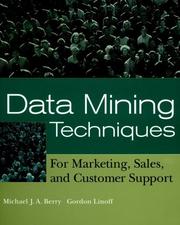
ISBN: 0471179809 9780471179801 Year: 1997 Publisher: N.Y., ... : J.Wiley & sons, Inc,
Abstract | Keywords | Export | Availability | Bookmark
 Loading...
Loading...Choose an application
- Reference Manager
- EndNote
- RefWorks (Direct export to RefWorks)
Who will remain a loyal customer and who won't?What kind of marketing approach is most likely to increase sales?What can customer buying patterns tell us about improving our inventory control?What type of credit approval process will work best for us and our customers?The answers to these and all your crucial business questions lie buried in your company's information systems. This book supplies you with powerful tools for mining them.Data Mining Techniques thoroughly acquaints you with the new generation of data mining tools and techniques and shows you how to use them to make better business decisions. One of the first practical guides to mining business data, it describes techniques for detecting customer behavior patterns useful in formulating marketing, sales, and customer support strategies. While database analysts will find more than enough technical information to satisfy their curiosity, technically savvy business and marketing managers will find the coverage eminently accessible. Here's your chance to learn all about:* How leading companies across North America are using data mining to beat the competition* How each tool works, and how to pick the right one for the job* Seven powerful techniques -cluster detection, memory-based reasoning, market basket analysis, genetic algorithms, link analysis, decision trees, and neural nets* How to prepare data sources for data mining, and how to evaluate and use the results you getData Mining Techniques shows you how to quickly and easily tap the gold mine of business solutions lying dormant in your information systems.
Artificial intelligence. Robotics. Simulation. Graphics --- Information systems --- Data mining --- Opzoeken van gegevens (Informatica) --- Recherche de données (Informatique) --- Marketing --- Business --- data processing --- Data processing --- 658.8 --- 658.3*H 28 --- -Data mining --- -AA / International- internationaal --- 301 --- Consumer goods --- Domestic marketing --- Retail marketing --- Retail trade --- Industrial management --- Aftermarkets --- Selling --- Algorithmic knowledge discovery --- Factual data analysis --- KDD (Information retrieval) --- Knowledge discovery in data --- Knowledge discovery in databases --- Mining, Data --- Database searching --- Trade --- Economics --- Management --- Commerce --- Marketing. Sales. Selling. Distribution --- Personnel. Human factor. Human relations (Staff relations. Personal or interpersonal relations). Working atmosphere--?*H--Christelijke kerken, secten. Kristelijke kerken--(algemeen) --- Techniek van statistische inlichtingen. Organisatie van de statistische enquêtes. Statistische kritiek. --- Data mining. --- Data processing. --- 658.3*H 28 Personnel. Human factor. Human relations (Staff relations. Personal or interpersonal relations). Working atmosphere--?*H--Christelijke kerken, secten. Kristelijke kerken--(algemeen) --- 658.8 Marketing. Sales. Selling. Distribution --- AA / International- internationaal --- Electronic data processing --- Techniek van statistische inlichtingen. Organisatie van de statistische enquêtes. Statistische kritiek --- Marketing - data processing --- Business - Data processing --- Information dans l'entreprise
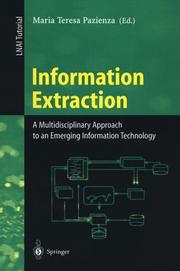
ISBN: 354063438X 3540695486 Year: 1997 Volume: 1299 Publisher: Berlin [etc.] : Springer-Verlag,
Abstract | Keywords | Export | Availability | Bookmark
 Loading...
Loading...Choose an application
- Reference Manager
- EndNote
- RefWorks (Direct export to RefWorks)
Information extraction (IE) is a new technology enabling relevant content to be extracted from textual information available electronically. IE essentially builds on natural language processing and computational linguistics, but it is also closely related to the well established area of information retrieval and involves learning. In concert with other promising and emerging information engineering technologies like data mining, intelligent data analysis, and text summarization, IE will play a crucial role for scientists and professionals as well as other end-users who have to deal with vast amounts of information, for example from the Internet. As the first book solely devoted to IE, it is of relevance to anybody interested in new and emerging trends in information processing technology.
Automatic data storage --- Automatic information retrieval --- Automatic language processing --- Automation in documentation --- Computational linguistics --- Computer linguistics --- Computer-based information systems --- Computerlinguïstiek --- Data storage and retrieval systems --- Informatieopslag en -naslagsystemen --- Information [Systèmes de mémorisation et de dépistage ] --- Information processing systems --- Information retrieval systems --- Information storage and retrieval systems --- Language and languages -- Data processing --- Language data processing --- Langue naturelle--Traitement des données (Informatique) --- Linguistics -- Data processing --- Linguistique -- Informatique --- Linguistique -- Traitement des données --- Linguistique computationnelle --- Linguistique informatique --- Linguistique informatisée --- Machine data storage and retrieval --- Mechanized information storage and retrieval systems --- Natural language processing (Computer science) --- Natural language processing (Linguistics) --- Natuurlijke taal--Gegevensverwerking (Informatica) --- Taalwetenschap -- Gegevensverwerking --- Tekstverwerking (Informatica) --- Text processing (Computer science) --- Traitement de textes (Informatique) --- Computer Science --- Engineering & Applied Sciences --- Processing, Text (Computer science) --- NLP (Computer science) --- Data processing systems --- Discovery systems, Information --- Information discovery systems --- Language and languages --- Linguistics --- Data processing --- Computer science. --- Information storage and retrieval. --- Artificial intelligence. --- Image processing. --- Computer Science. --- Artificial Intelligence (incl. Robotics). --- Signal, Image and Speech Processing. --- Image Processing and Computer Vision. --- Information Storage and Retrieval. --- Pictorial data processing --- Picture processing --- Processing, Image --- Imaging systems --- Optical data processing --- AI (Artificial intelligence) --- Artificial thinking --- Electronic brains --- Intellectronics --- Intelligence, Artificial --- Intelligent machines --- Machine intelligence --- Thinking, Artificial --- Bionics --- Cognitive science --- Digital computer simulation --- Electronic data processing --- Logic machines --- Machine theory --- Self-organizing systems --- Simulation methods --- Fifth generation computers --- Neural computers --- Informatics --- Science --- Computer vision. --- Information storage and retrieva. --- Artificial Intelligence. --- Information storage and retrieval systems. --- Machine vision --- Vision, Computer --- Artificial intelligence --- Image processing --- Pattern recognition systems --- Computer systems --- Electronic information resources --- Data libraries --- Digital libraries --- Information organization --- Information retrieval --- Signal processing. --- Speech processing systems. --- Optical data processing. --- Optical computing --- Visual data processing --- Integrated optics --- Photonics --- Computers --- Electronic systems --- Information theory --- Modulation theory --- Oral communication --- Speech --- Telecommunication --- Singing voice synthesizers --- Processing, Signal --- Information measurement --- Signal theory (Telecommunication) --- Optical equipment --- Computational linguistics. --- Human-computer interaction --- Semantic computing --- Data centers --- Applied linguistics --- Cross-language information retrieval --- Mathematical linguistics --- Multilingual computing
| Listing 1 - 7 of 7 |
Sort by
|

 Search
Search Feedback
Feedback About
About Help
Help News
News